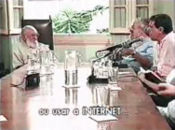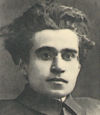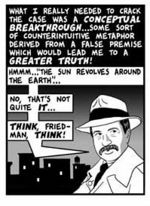Open Education: Precursors
Contents
Defining Open Education
Open Education: "forms of education in which knowledge, ideas or important aspects of teaching methodology or infrastructure are shared freely over the internet." (Wikipedia Entry for Open Education)
This definition indicates that there are three essential components to Open Education:
- teaching and learning (educational) processes
- technology and technological infrastructure
- open or free access to these processes
The Venn diagram, right, shows how these three components interrelated. Conceptually, Open Education is located in the green triangle at the centre of the diagram, where the three circles overlap.
Open Education is a term that has recently gained currency, and whose meaning is changing along with the contexts of its use.
Open education echoes other open endeavors:
- Open Source Software
- Open Access (Publishing; e.g., see an overview by Peter Surber)
- Open Educational Resources (e.g., see OECD Report
| This learning resource presupposed some familiarity with Open Educational Resources, Open Content, and with E-Learning generally. |
Open Education is also associated with a number of organizations, declarations, and documents; e.g:
- The Centre for Open and Sustainable Learning
- Cape Town Open Education Declaration
- Open Education, the Long Tail, and Learning 2.0
| "Open" approaches to education have a long and important history. Understanding teaching and learning as having intrinsic value, and using technology as a way of openly engaging in these activities is at least as old as the Enlightenment!
Each of the precursors featured here address at least 2 of the 3 components of open education listed above --even though they were around decades before open education. |
Historical & Conceptual Background of Open Education
There are few documents discussing the background and the precursors of Open Education. The few that do exist only go back as far as the development of open source software. E.g.:
- Raymonds (1997) Cathedral and Bazaar as historical and conceptual background OER Handbook for Educators
- Brief Background History of Open Education
*Many have seen the ideas of Thomas Friedman's The World as Flat a as providing the conceptual background for Open Education. This includes:
|
Each of the precursors discussed below makes an important contribution to "Open Education," specifically on progressive, political grounds:
- Antionio Gramsci: asserts that teaching and learning (educational) processes are politically necessary --and necessarily political
- Walter Benjamin: sees new media technologies as presenting new educational potential
- Paulo Friere: describes open or free access to education as a practice both politically motivated and technologically-mediated
- Popular Education: combines openness with political motivation in actual institutions that exist in France, Scandinavia and elsewhere.
Antonio Gramsci
Overview
- Italy (1891 – 1937)
- Founding member of Communist Party in Italy
- Imprisoned by Mussolini; most famous writings from prison (notebooks)
- Provides the basis for open education as politically necessary and necessarily political
- Keywords:
- Ideology; Hegemony
- Organic Intellectuals
Culture: “exercise of thought, acquisition of general ideas, habit of connecting causes and effects” (Gramsci, 1985, 23)
Hegemony & Ideology: "shared ideas or beliefs which serve to justify the interests of dominant groups" (A. Giddens 1997)
"spontaneous consent" of the populace through intellectual leadership or authority
Everyone: "carries on some form of intellectual activity participates in a particular conception of the world, has a conscious line of moral conduct, and therefore contributes to sustain a conception of the world or to modify it, that is, to bring into being new modes of thought"
Importance for Open Education:
- knowledge is a tool for oppression and emancipation
- everyone is (potentially) an intellecual, an participant in knowledge
- education and knowledge are about changing the world
Walter Benjamin

Overview
- Germany (1892-1940)
- associated with the Frankfurt School of critical theory
- sociological & cultural critic
- Most famous essay: “The Work of Art in the Age of Mechanical Reproducibility”
Summary of “The Work of Art in the Age of Mechanical Reproducibility”
- Mechanical reproduction of art means that its “aura” “withers:” “the technique of reproduction detaches the reproduced object from the domain of tradition.”
- This is not bad, but good: "For the first time in world history, mechanical reproduction emancipates the work of art from its parasitical dependence on ritual.“
- Sees new forms in film of the late 1920’s and 1930’s as illustrative of this emancipation from ritual and heritage (e.g., Bunuel, Riefenstahl - see media, below)
- This kind of art is “received” in a state of “distraction”
- Benjamin sees this distracted reception as enabling a the “convergence of educational value and consumer value in a new kind of learning” (Eiland, 2005)
- “The distracted person, too, can form habits. More, the ability to master certain tasks in a state of distraction proves that their solution has become a matter of habit. Distraction as provided by art [means that] new tasks have become soluble by apperception.” (W. Benjamin)
Importance for Open Education:
- Aesthetic characteristics of new technical media can present both potential and challenges for learning
- This is politically relevant; not as direct emancipation from earlier constraints and limitations, but through the development of new modes of “reception;” new sensibilities
- Technology as cultural in its educational significance
Fragments for Walter Benjamin (1993) See the clip
Triumph of the Will (1935)See the clip
The Andalusian Dog (1929) See the clip Warning: Disturbing content!
Paulo Freire
General:
- 1921-1997
- Brazilian educator and influential theorist of critical (politically engaged) pedagogy
- Developed “cultural circles” for teaching reading and writing; imprisoned for this
- This was a political act because literacy was a requirement for voting.
Freire had a nuanced understanding of Technology, and saw it as capable of changing and democratizing education:
- “The answer does not lie in the rejection of the machine but in the humanization of man.”
- Says that: I’m a “man of television” and “man of radio.”
- "It is not the media themselves which I criticize, but the way they are used."
As minister of education for Brazil, Freire ordered 35,000 slide projectors to be used for literacy education:
- projectors used to display “codified pictures” at the centre of this instruction
- Codified pictures: visual representations of existential situations
- Each picture presents elements to be “decoded” by the participants
- Literacy education is combined “with lessons in self-reflection, cultural identity & political agency.” (Kahn & Kellner, 2007)
Examples of codified pictures used by Freire:
Debate: Paulo Freire vs. Seymour Papert on computer technology and the future of the school

Educational technologist Seymour Papert and Paolo Freire participated in this discussion or debate in São Paulo, Brazil during the late 1980s. It is titled "The Future of the School: the impact of new media on the model of school today" (O Futuro da escola: impacto dos novos meios de comunicacao no modelo de escola atual). It was sponsored by Pontifícia Universidade Católica, the Catholic University of São Paulo; and the Afternoon Journal TV show. It was broadcast in Brazil by TV PUC São Paulo and KTV Solucoes. It is available in four parts:
- a complete English transcript of the interview is available at papert.org
- all four parts can be downloaded at the Brazil-based Biblioteca Digital Paulo Friere
The transcript below is a portion of the interview, spanning parts one and two of the video (a slightly extended version is available from Google video). It captures Freire's response to a central point in Papert's thought that is still controversial today: the idea that computer technology and media will spell the "end of the school."
| Seymour Papert:
...children have a new instrument with which to refuse the oppression, to refuse to be placed in this position and to maintain their curiosity and a sense of their own intellectual power that they had when they were born. You see, nothing is more ridiculous than the idea that this technology can be used to improve school. It's going to displace school and the way we have understood school. Of course, there will always be, we hope, places where children will come together with other people and will learn. But I think that the very nature, the fundamental nature, of school that we see in this process, is coming to an end. And I think that in 10, 20 years. We don't want to be prophets, but in this area things have usually happened much faster than in other areas. So the goal of educators has to be to think about new ways of relating to children and relating in the triangle between the adult and the child and knowledge. I think we just need thoroughly different relationships, and that's not going to come easily or automatically. And that's the test. |
Paulo Freire:
I agree with Papert's analysis of the three stages, the three moments he established in the experience of the production of knowledge. I find this division very lucid, and I agree with his criticism of the second stage, which is the school stage. But I don't accept his proposal that this isn't really a proposal. He does not propose. He says that the ending of school is inevitable. It's the end … that is not proposing. Seymour Papert: And it's very hard to get educators to see that distinction. Paulo Freire: Yes. Absolutely. To me this is not a statement yet. I state that school is bad, but I don't state that school is disappearing and will disappear. That's why I am appealing to all of us who have escaped cognitive death by school -- who are the survivors here -- to work on modifying it. For me, the challenge is not to end school, but to change it completely and radically and to help it to give birth from a body that doesn't correspond anymore to the technological truth of the world … to a new being as actual as technology itself. |
Papert's argument is explicit and can be summarized as:
- the end of school is not a proposal or a suggestion, it is inevitable
- it is inevitable because of the humans are "born to learn" (as revealed by Jean Piaget's and Papert's own understandings of 3 or more developmental stages)
- the end of school it is inevitable because of computer technology can act as a tool for enabling natural, exploratory learning
- students will no longer need the organization of school to learn; they will do so spontaneously with computers
Freire's argument is more implicit and can be interpreted as:
- no social change is inevitable; it occurs through human labour and struggle
- technology is important to education not so much as a tool, but as an example that is ontological (in terms of its being; the way that it is):
- it embodies a "technological truth of the world" that is to be overcome
- it shows how we can shape the world and ourselves, pointing to "a new being [that can be] as actual as technology itself"
- Freire also speaks of schooling later in this debate as follows: "My problem is the following: How do we do the essential transition from the common knowledge and common sense to the more methodically rigorous knowledge of the sciences without the proper organization provided by an entity specialized in this matter?"
- See "The Schools of the Future" (Sawyer, 2006) and "After How Comes What" (Papert, 2006), to see how the issues raised in this debate have retained their relevance up to the present time (both are chapters from The Cambridge Handbook of the Learning Sciences).
Popular Education

Popular education may be defined as an educational technique designed to raise the consciousness of its participants and allow them to become more aware of how an individual's personal experiences are connected to larger societal problems. Participants are empowered to act to effect change on the problems that affect them. (This definition and the first three points provided below are from Wikipedia)
- The Vincennes University (today located in Saint-Denis) was first a "Experimental University Center," with an interest in reshaping relations between students and teachers.
- the courses were focused on Freudo-Marxism, psychoanalysis, Marxist theory, cinema, theater, urbanism or artificial intelligence.
- Vincennes had no amphitheatres, representatives of the mandarin (teaching class) facing and dominating by his position several hundreds students ...taking notes. It also enforced a strict equality between professors and teaching assistants.
- to get an impression of the relations between students, student radicals and professors, see this film clip of Lacan giving a presentation (unfortunately not at the Vincennes, but from a guest lecture at the Catholic University of Louvain).
Lessons from the Past
|
All 4 precursors --Gramsci, Benjamin, Freire, and Popular Education-- present learning and education as something quite different from the way Thomas Friedman describes it. Friedman describes it in many ways in The World is Flat. At one point he describes it as a "mad dash" onto "the flat-world field...of 1.5 billion new workers in the global economic labor force"(216) where everyone will compete on a level surface. The precursors to open education show that it is education is not about competing in a world or a game whose parameters are already set. Gramsci, Benjamin and Freire show us that it is instead about changing those parameter. Ronald Aronica and Mtetwa Ramdoo, authors of The World is Flat? - A Critical Analysis provide a pointed rebuttal of both the one-sided content and blunt style of Friedman's book
|
Critics of Friedman Friedman's pronouncements offer much for critique; here are two examples: "Friedman's book is a testament to how you can be... a resort town-to-resort town peripatetic, never really visiting the vast global ghetto made of upwards of three billion people surviving on two dollars a day and with limited access to potable water." (Spincycle) "Ultimately, Friedman’s work is little more than advertising. The goal is not to sell the high-tech gadgetry described in page after page of the book, but to sell a way of life — a world view glorifying corporate capitalism and mass consumption as the only paths to progress. ...This book’s lighthearted style might be amusing were it not for the fact that his subject — the global economy — is a matter of life and death for millions. Friedman’s words and opinions, ill informed as they are, shape the policies of leaders around the world. Many consider him to be a sophisticated thinker and analyst — not a propagandist." (Roberto Gonzales, quoted in Spincycle) Judge for yourself; check out: |
*Understanding the past can determine the future of open education
|











